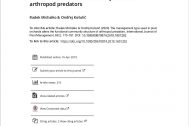Obsah
The management practices in agroecosystems can alter the community structure of pests’ natural enemies, which can consequently disturb their biocontrol function. Here, we investigated how organic or conventional farming influence the community structure of arthropod predators (spiders, coccinelids, anthocorids, ants) in orchards. The three conventional orchards studied were plum tree monocultures where mainly fungicides were applied. The three organic orchards studied were dominated by plum trees with admixture of apple trees and no agrochemical was applied. We found that management significantly affected only spiders that were less abundant in the conventional orchards than in the organic orchards. In addition, the conventional management resulted in reduced species density and altered the community composition of spiders. The conventional management reduced the functional dispersion of spider body size, which may narrow the size-spectrum of pests that could be reduced by spiders. The conventional management also reduced abundances of foliage hunters and space-web spiders. Since these spiders are effective against various insect pests, the conventional management of applying fungicides might result in increased crop damage via increased insect pests.



